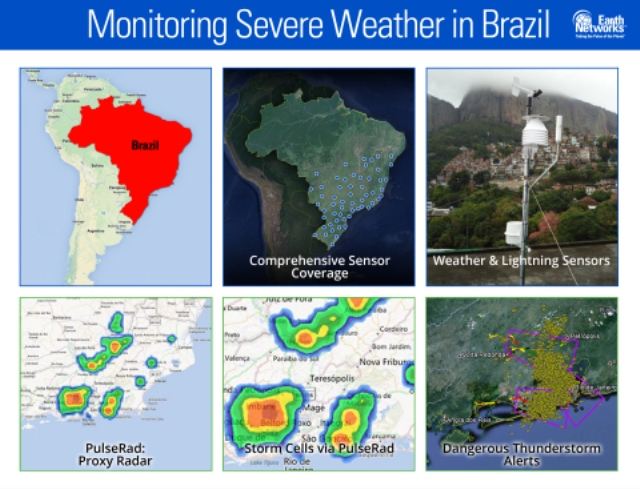Dec 5 2013
Rio de Janeiro’s subtropical climate and coastal location make it vulnerable to intense storms with lightning, heavy rainfall and extreme flooding. In January 2011 alone, flooding and mudslides killed more than 900 and left thousands throughout the state homeless because timely weather alerts are not available throughout Brazil.
To help prevent future tragedies, officials at the State Environmental Institute (INEA) in Rio de Janeiro, Brazil, are utilizing a state-of-the-art Early Warning System comprised of real-time weather monitoring and automated alerts from Earth Networks to help them make the most informed and timely decisions for approaching severe weather.
 Earth Networks, as part of a public-private partnership with the National Institute for Space Research (INPE) and partner Simtech, has helped establish the Brazilian Total Lightning Network (BrasilDAT). Data from the lightning sensors enables PulseRad, a proxy radar product; automated Dangerous Thunderstorm Alerts (DTAs); and real-time observations and forecasts. (Graphic: Business Wire)
Earth Networks, as part of a public-private partnership with the National Institute for Space Research (INPE) and partner Simtech, has helped establish the Brazilian Total Lightning Network (BrasilDAT). Data from the lightning sensors enables PulseRad, a proxy radar product; automated Dangerous Thunderstorm Alerts (DTAs); and real-time observations and forecasts. (Graphic: Business Wire)
INEA, the agency chartered to protect, conserve and restore the environment of the State of Rio de Janeiro to promote sustainable development, is using Earth Networks early warning technology to continuously track thunderstorms capable of producing significant precipitation. Meteorologists at the agency are also using Earth Networks technology to improve nowcasting and forecasting for areas vulnerable to flooding, and issue severe weather alerts faster to areas where frequent, destructive mudslides caused by flooding threaten to destroy homes, displace residents and tragically claim human lives. The peak of the rainy season in Brazil runs from December to March.
For the first time ever, INEA is monitoring real-time weather conditions, tracking approaching thunderstorms and viewing precipitation and lightning as it occurs using a computer weather-visualization tool called StreamerRTSM from Earth Networks. Meteorologists in the State of Rio de Janeiro are also receiving automated warnings of severe weather for the first time. These warnings, called DTAs (Dangerous Thunderstorm Alerts), are triggered when total lightning flash rates reach a high threshold – a key indicator of impending severe weather. When compared to traditional warnings based on radar and manual methods, DTAs have been shown to provide alerts to thunderstorms and other severe weather 50% faster for storms with lightning.
“INEA is always looking for tools to improve disaster forecasting,” says Carlos Alberto Fonteles, Director of Information, Monitoring and Surveillance at INEA. “The early warning system from Earth Networks will contribute to the advancement of technologies employed by the Institute, providing greater predictability and anticipation of alerts. The technology is also assisting us in the protection of vulnerable communities from natural disasters in the state of Rio de Janeiro.”
This early warning technology also enables INEA officials to tap into one of the world’s most dense, scientifically advanced lightning sensor networks – the Brazilian Total Lightning Network (BrasilDAT). BrasilDAT is operated through a public-private partnership with Earth Networks and the Instituto Nacional de Pesquisas Espaciais (INPE), Brazil’s National Institute for Space Research. Since 2010, Earth Networks has been working with Dr. Osmar Pinto, Jr., Coordinator of INPE’s Atmospheric Electricity Group (ELAT), to significantly expand the BrasilDAT network throughout the country with additional sensors for detecting both cloud-to-ground and in-cloud lightning, known as total lightning. The vast majority of lightning is in-cloud, and high rates of it often precede extreme weather – making it a vital part of the severe weather monitoring and alerting process by enabling early warnings.
With this new technology, INEA also expects to be able to provide other government agencies in the state with additional advanced warnings of severe weather.
Learn more: http://www.earthnetworks.com/Products/EarlyWarningSystem/Brazil.aspx